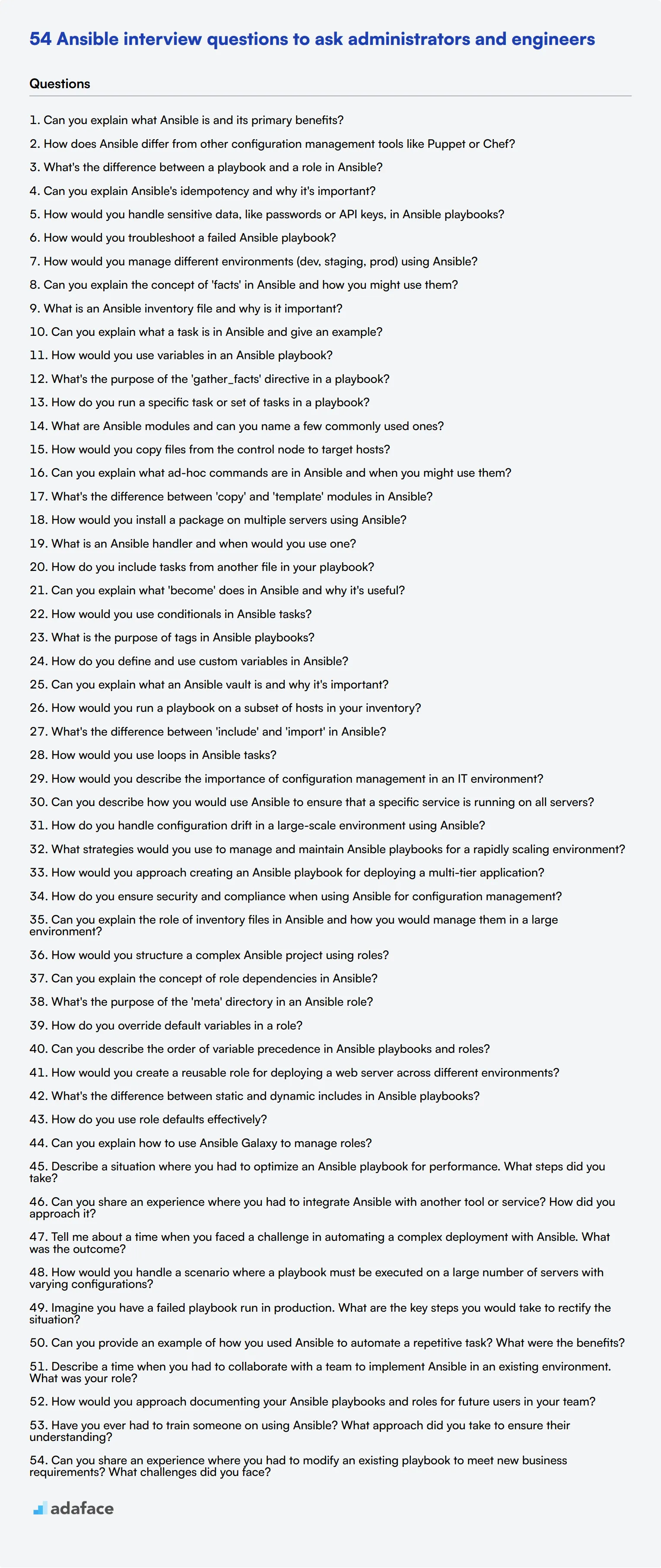Hiring the right Ansible administrator can significantly impact your organization's infrastructure management and automation capabilities. Knowing the right questions to ask during interviews helps you identify candidates with the necessary skills and experience to excel in this role.
This blog post provides a comprehensive list of Ansible interview questions, categorized for different experience levels and specific areas of expertise. From basic concepts for junior administrators to advanced topics for seasoned professionals, we've got you covered with questions on configuration management, playbooks, roles, and real-world scenarios.
By using these questions, you'll be able to thoroughly assess candidates' Ansible knowledge and problem-solving abilities. Consider combining these interview questions with a pre-screening Ansible skills assessment to streamline your hiring process and ensure you're selecting the most qualified candidates.
Table of contents
Top 8 Ansible questions to ask in interviews
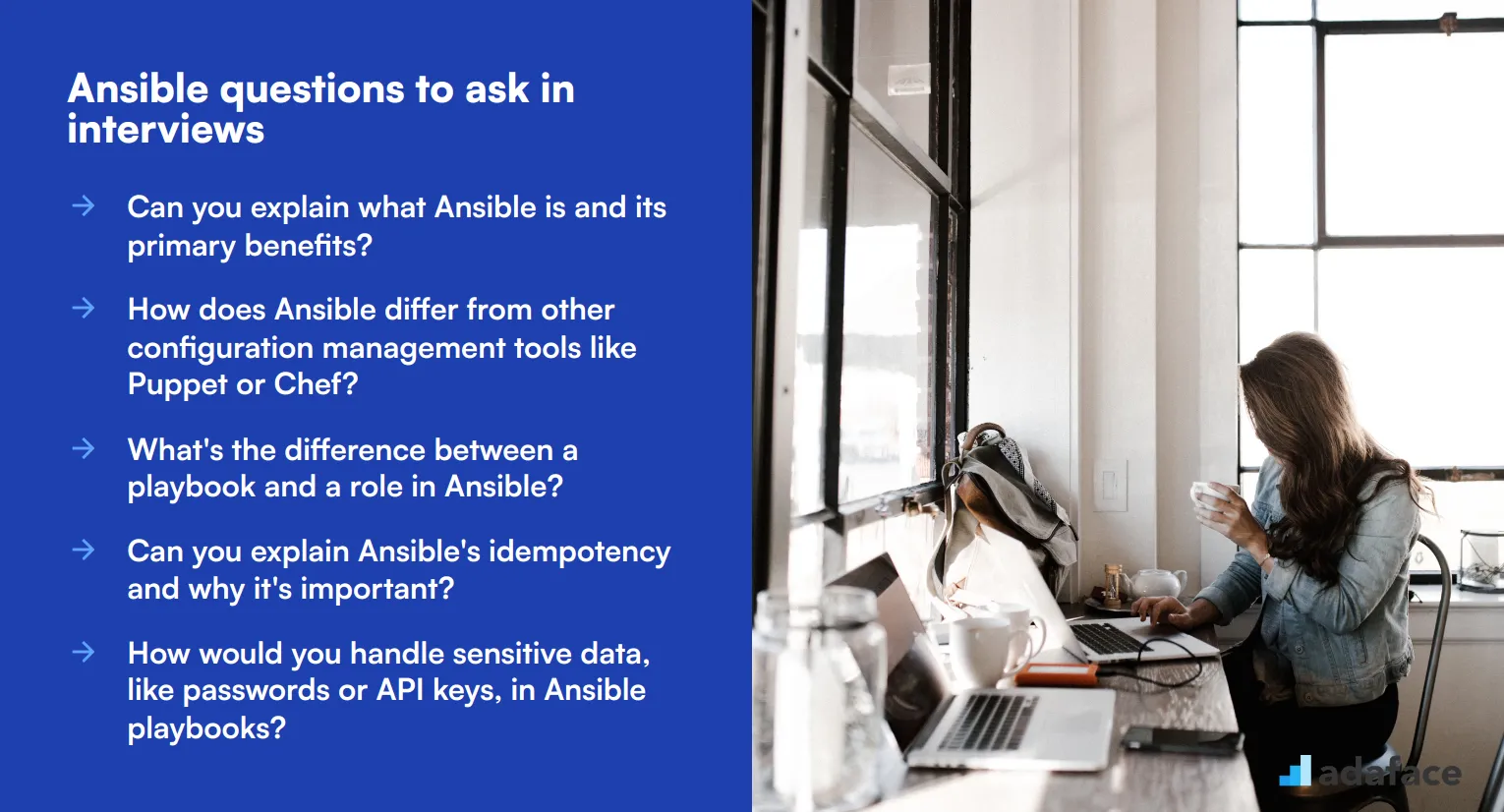
Ready to find your next Ansible superstar? These top 8 questions will help you uncover candidates with the right mix of technical know-how and problem-solving skills. Use them to spark insightful conversations and gauge how well applicants understand Ansible's core concepts and best practices. Remember, the goal is to assess both knowledge and practical application!
1. Can you explain what Ansible is and its primary benefits?
A strong candidate should be able to explain that Ansible is an open-source automation tool used for configuration management, application deployment, and task automation. They should highlight its agentless architecture, which means it doesn't require any software to be installed on the managed nodes.
Key benefits to listen for include:
- Simplicity and ease of use
- Agentless architecture
- Uses YAML for playbooks, which is human-readable
- Idempotency (can run tasks multiple times without changing the result beyond the initial application)
- Large community and extensive module library
Look for candidates who can articulate how these benefits translate to real-world advantages, such as reduced deployment times, improved consistency across environments, and easier management of complex infrastructures.
2. How does Ansible differ from other configuration management tools like Puppet or Chef?
An ideal answer should compare Ansible's key features with those of Puppet and Chef. Candidates should mention:
- Ansible's agentless architecture vs. the agent-based approach of Puppet and Chef
- Ansible's use of YAML for playbooks vs. DSL (Domain Specific Language) used by Puppet and Chef
- Ansible's push-based model vs. the pull-based model of Puppet and Chef (though they can also operate in push mode)
Candidates might also discuss the relative ease of setup and learning curve, with Ansible generally considered simpler to get started with due to its agentless nature and use of YAML.
Listen for nuanced understanding of when each tool might be preferable. A strong candidate will avoid blanket statements about one tool being 'better' and instead discuss scenarios where each tool's strengths shine.
3. What's the difference between a playbook and a role in Ansible?
A good answer should clearly differentiate between playbooks and roles:
- Playbooks are YAML files that define a set of tasks to be executed on managed hosts. They're the main way to define and run automation jobs in Ansible.
- Roles are ways of automatically loading certain vars_files, tasks, and handlers based on a known file structure. They're essentially ways to organize playbooks and make them more reusable.
Candidates should explain that roles allow for better organization and reusability of Ansible code. A role might include tasks, variables, files, templates, and modules, all organized in a standardized directory structure.
Look for candidates who can provide examples of when they would use a simple playbook versus when they would create a role. Understanding this distinction shows a grasp of Ansible best practices and efficient code organization.
4. Can you explain Ansible's idempotency and why it's important?
A strong answer should define idempotency as the property of certain operations in mathematics and computer science whereby they can be applied multiple times without changing the result beyond the initial application.
In the context of Ansible, idempotency means that running a playbook multiple times should result in the same state each time, without unintended side effects. Candidates should explain why this is crucial:
- It allows for safer, more predictable automation
- It reduces the risk of unintended changes or system states
- It enables easier troubleshooting and system auditing
- It allows for partial runs or retries without fear of breaking the system
Look for candidates who can provide examples of idempotent tasks (like ensuring a package is installed) versus non-idempotent tasks (like appending to a file without checks). This demonstrates a deep understanding of how to write robust, reliable Ansible playbooks.
5. How would you handle sensitive data, like passwords or API keys, in Ansible playbooks?
A comprehensive answer should mention Ansible Vault as the primary tool for encrypting sensitive data. Candidates should explain that Ansible Vault can encrypt individual variables, files, or entire playbooks.
Other points to listen for:
- Use of environment variables for sensitive data
- Storing encrypted files in version control
- Using --ask-vault-pass or --vault-password-file when running playbooks
- Importance of proper key management and rotation practices
Strong candidates might also discuss integrating Ansible with external secret management tools like HashiCorp Vault or AWS Secrets Manager for more complex security requirements. Look for answers that emphasize the importance of never storing plain-text secrets in playbooks or version control.
6. How would you troubleshoot a failed Ansible playbook?
A good answer should outline a systematic approach to troubleshooting:
- Check the error message for specific details
- Use increased verbosity (-v, -vv, or -vvv) when running the playbook to get more information
- Use the --step option to run the playbook step by step
- Check the syntax of the playbook using ansible-playbook --syntax-check
- Verify connectivity to the target hosts
- Ensure the necessary permissions are in place
Candidates might also mention:
- Using the debug module to print variable values
- Checking the ansible.cfg file for any conflicting settings
- Verifying that all required roles and collections are installed
- Using the --start-at-task option to run the playbook from a specific task
Look for answers that demonstrate a methodical approach to problem-solving and familiarity with Ansible's built-in troubleshooting tools. Strong candidates will also mention the importance of maintaining clear, well-commented playbooks to aid in troubleshooting.
7. How would you manage different environments (dev, staging, prod) using Ansible?
A comprehensive answer should discuss several strategies:
- Using inventory files: Separate inventory files for each environment
- Group variables: Utilizing group_vars to define environment-specific variables
- Roles: Creating roles that are environment-agnostic, with environment-specific variables
- Tags: Using tags to selectively run tasks based on the environment
Candidates might also mention:
- Using dynamic inventories for cloud environments
- Employing Ansible Tower/AWX for role-based access control in different environments
- Utilizing environment-specific playbooks that import a common base playbook
Look for answers that emphasize the importance of maintaining consistency across environments while allowing for necessary differences. Strong candidates will discuss strategies for minimizing environment-specific code and maximizing reusability.
8. Can you explain the concept of 'facts' in Ansible and how you might use them?
A good answer should explain that facts are variables that contain information about the system, automatically discovered by Ansible from the managed hosts. Candidates should mention that facts are gathered by default at the beginning of a playbook run, unless explicitly disabled.
Examples of how facts can be used:
- Conditionally executing tasks based on the operating system or hardware specifications
- Dynamically setting variables based on system information
- Creating custom reports or inventories
- Debugging and troubleshooting
Look for candidates who can provide specific examples of using facts in playbooks, such as using ansible_distribution to apply OS-specific configurations or ansible_memory_mb to adjust application settings based on available memory. Strong candidates might also mention custom facts and how to disable fact gathering for performance reasons when it's not needed.
20 Ansible interview questions to ask junior administrators
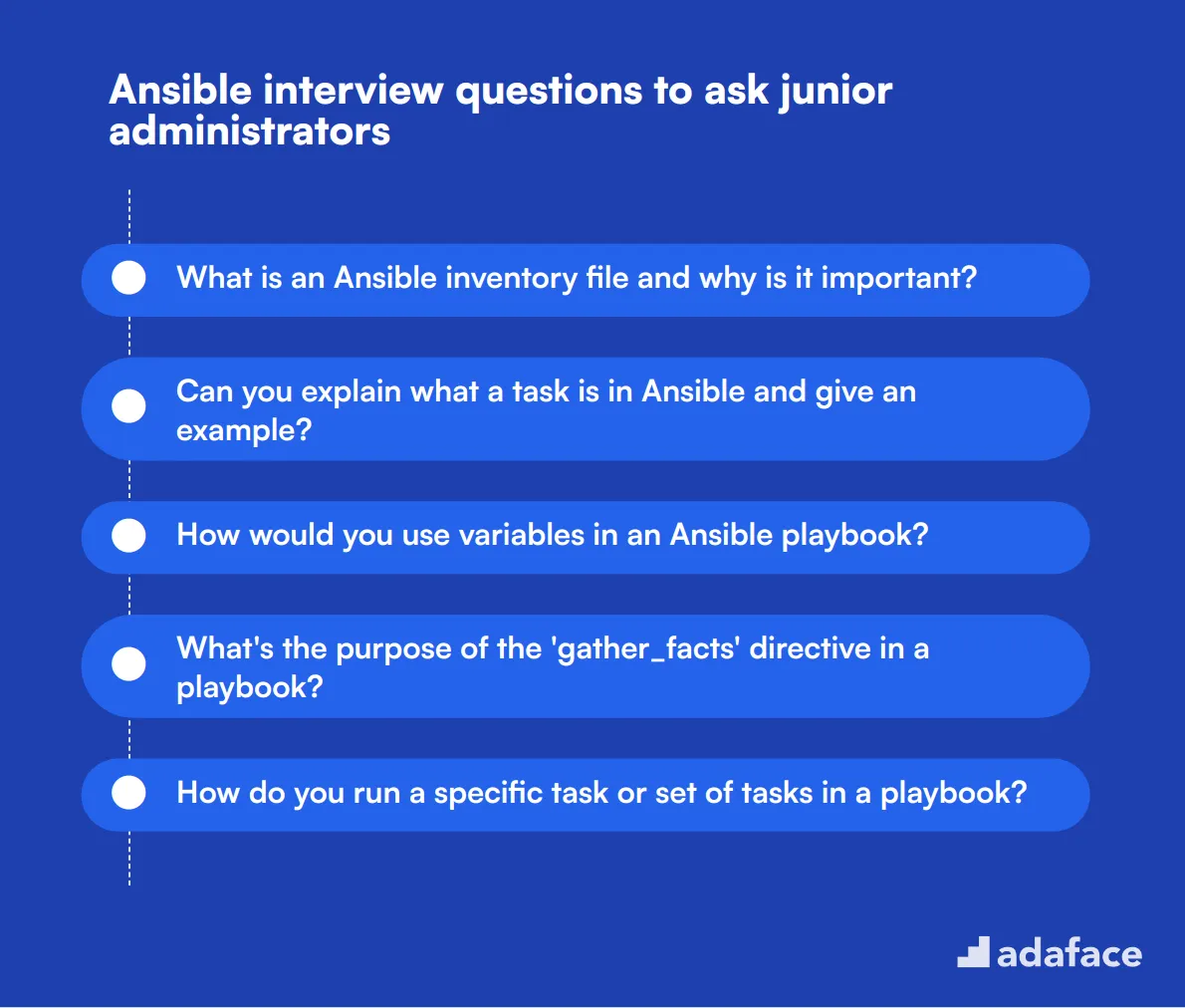
To assess the foundational knowledge of junior DevOps engineers in Ansible, consider using these interview questions. They cover essential concepts and practical applications, helping you gauge a candidate's understanding and potential fit for your team.
- What is an Ansible inventory file and why is it important?
- Can you explain what a task is in Ansible and give an example?
- How would you use variables in an Ansible playbook?
- What's the purpose of the 'gather_facts' directive in a playbook?
- How do you run a specific task or set of tasks in a playbook?
- What are Ansible modules and can you name a few commonly used ones?
- How would you copy files from the control node to target hosts?
- Can you explain what ad-hoc commands are in Ansible and when you might use them?
- What's the difference between 'copy' and 'template' modules in Ansible?
- How would you install a package on multiple servers using Ansible?
- What is an Ansible handler and when would you use one?
- How do you include tasks from another file in your playbook?
- Can you explain what 'become' does in Ansible and why it's useful?
- How would you use conditionals in Ansible tasks?
- What is the purpose of tags in Ansible playbooks?
- How do you define and use custom variables in Ansible?
- Can you explain what an Ansible vault is and why it's important?
- How would you run a playbook on a subset of hosts in your inventory?
- What's the difference between 'include' and 'import' in Ansible?
- How would you use loops in Ansible tasks?
7 Ansible interview questions and answers related to configuration management
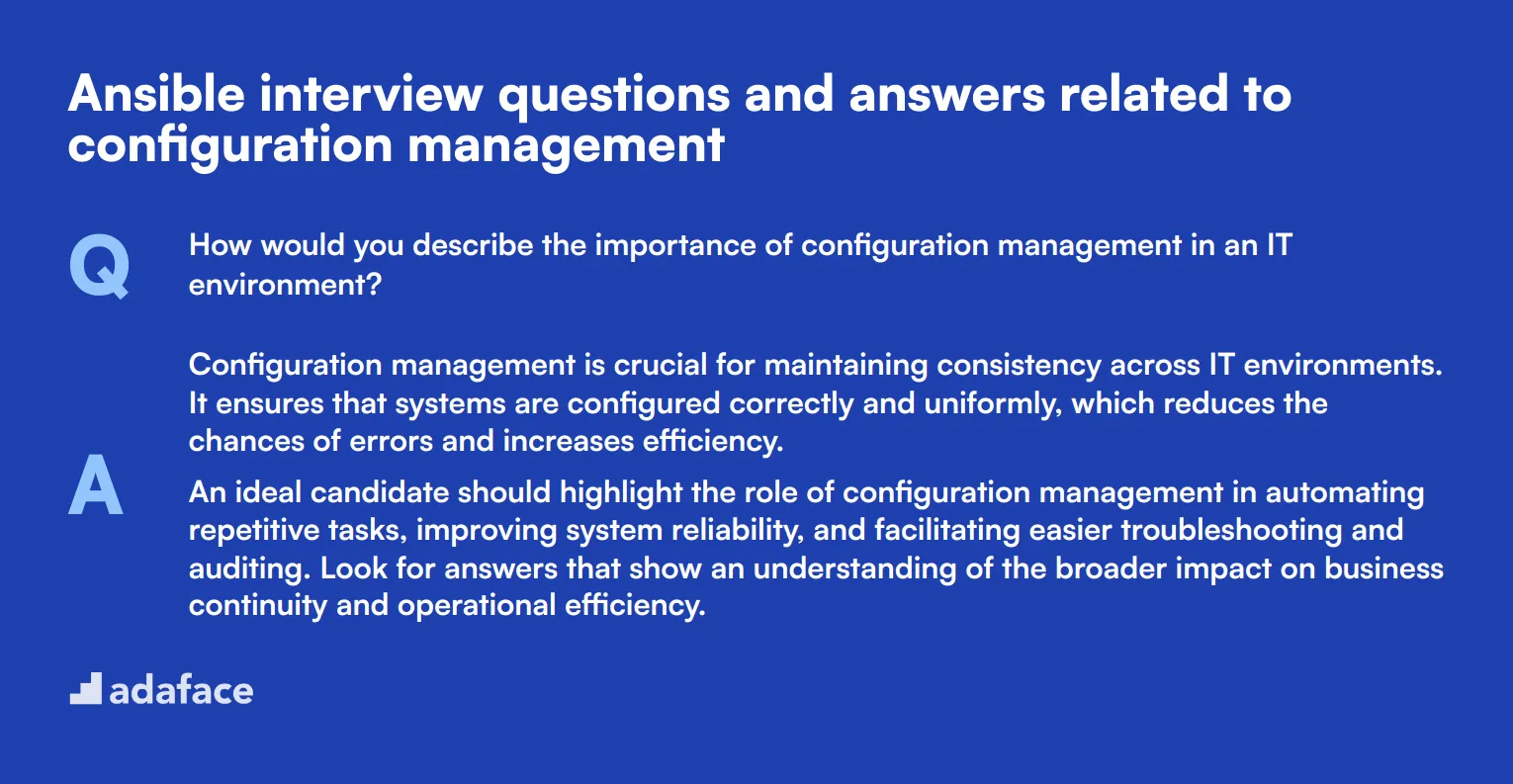
To determine if your applicants have a solid grasp on configuration management using Ansible, here are some targeted questions that will help you assess their understanding and practical knowledge. Use these questions during interviews to gauge the depth of their experience and their ability to handle real-world scenarios.
1. How would you describe the importance of configuration management in an IT environment?
Configuration management is crucial for maintaining consistency across IT environments. It ensures that systems are configured correctly and uniformly, which reduces the chances of errors and increases efficiency.
An ideal candidate should highlight the role of configuration management in automating repetitive tasks, improving system reliability, and facilitating easier troubleshooting and auditing. Look for answers that show an understanding of the broader impact on business continuity and operational efficiency.
2. Can you describe how you would use Ansible to ensure that a specific service is running on all servers?
To ensure a specific service is running on all servers, you would typically create a playbook that includes a task to check the status of the service and start it if it's not running. This can be done using the 'service' module in Ansible.
Strong candidates will mention the use of handlers to restart services if configurations change and describe how they would verify the service status post-deployment. Look for mentions of idempotency, which ensures the playbook can be run multiple times without causing issues.
3. How do you handle configuration drift in a large-scale environment using Ansible?
Configuration drift happens when the configuration of a system diverges from the desired state defined by the configuration management tool. In Ansible, you can handle this by regularly running playbooks to enforce the desired state.
Candidates should discuss the importance of regular audits and monitoring to detect drift. They might also mention using CI/CD pipelines to ensure configurations are applied consistently. Look for answers that include proactive measures and mechanisms to quickly remediate drift.
4. What strategies would you use to manage and maintain Ansible playbooks for a rapidly scaling environment?
In a rapidly scaling environment, maintaining Ansible playbooks requires adhering to best practices like modularizing playbooks, using roles, and proper version control. Roles help in organizing tasks, variables, and handlers, making the playbooks more manageable and reusable.
An ideal candidate will mention the use of version control systems like Git to track changes and collaborate on playbooks. They may also discuss the importance of documentation and automated testing to ensure the playbooks scale effectively. Look for a clear understanding of maintaining order and consistency as the environment grows.
5. How would you approach creating an Ansible playbook for deploying a multi-tier application?
Creating a playbook for a multi-tier application involves defining tasks for each tier, such as the database, application server, and web server. Each tier would have its own set of configurations and dependencies that need to be managed.
Candidates should outline how they would use roles to separate concerns and ensure each tier is configured correctly. They might also mention the use of variables and templates to handle different configurations for different environments. Look for comprehensive answers that show planning and attention to detail.
6. How do you ensure security and compliance when using Ansible for configuration management?
Ensuring security and compliance involves using Ansible's features like Ansible Vault to encrypt sensitive data, and employing role-based access controls to limit who can run or modify playbooks.
Candidates should discuss how they keep playbooks and configurations up-to-date with the latest security patches and compliance requirements. Look for mentions of automated compliance checks and audits to ensure continuous security and compliance adherence.
7. Can you explain the role of inventory files in Ansible and how you would manage them in a large environment?
Inventory files in Ansible define the hosts and groups of hosts on which Ansible will run tasks. Managing inventory files in a large environment involves organizing hosts into groups and possibly using dynamic inventory scripts to automatically generate inventory from cloud providers or other sources.
Look for candidates who talk about using dynamic inventory for scalability and ease of management. They should also mention using group variables and host variables to manage different configurations across various environments effectively.
9 Ansible interview questions about playbooks and roles
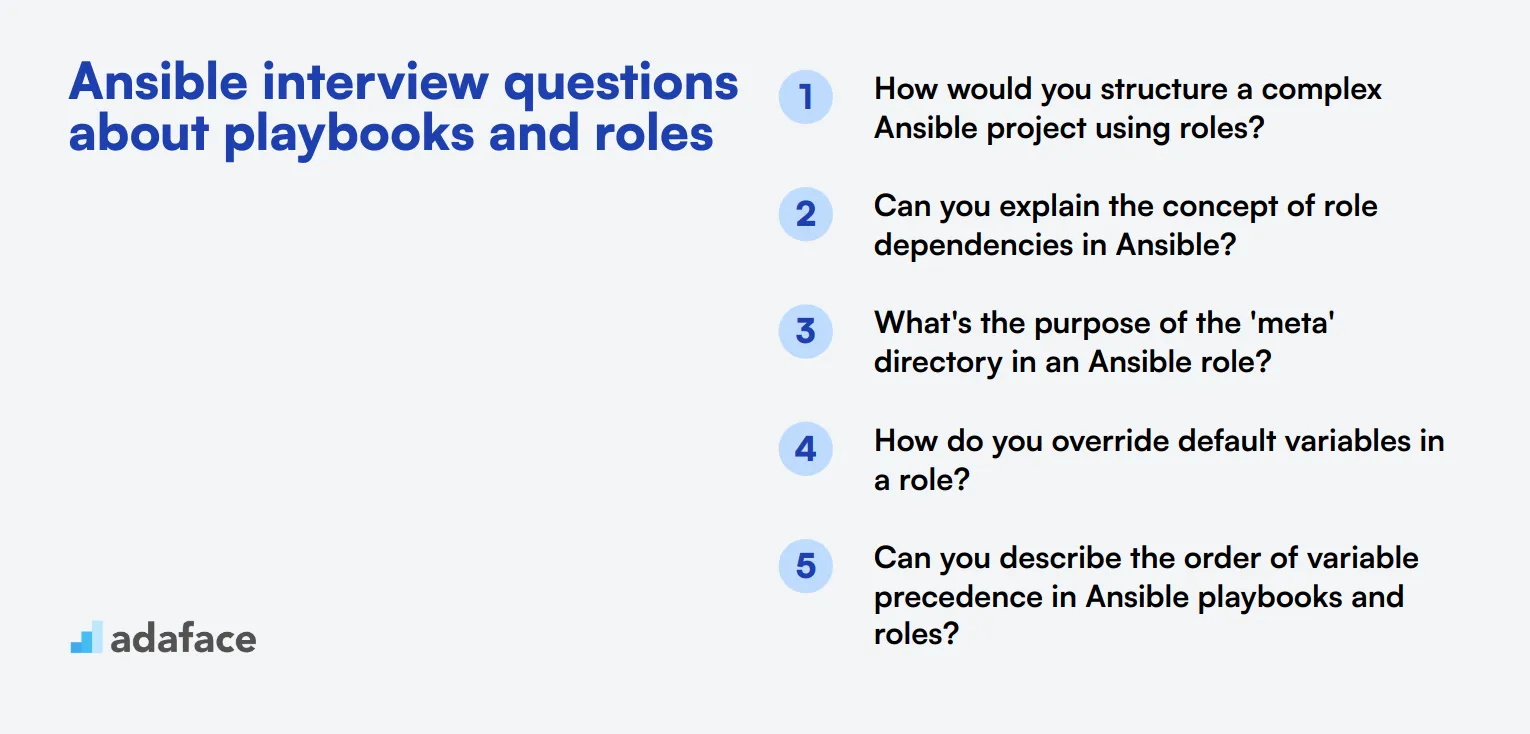
To assess a candidate's proficiency with Ansible playbooks and roles, crucial for DevOps engineers, use these targeted questions. They'll help you gauge the applicant's ability to structure, organize, and implement automation effectively using Ansible's core features.
- How would you structure a complex Ansible project using roles?
- Can you explain the concept of role dependencies in Ansible?
- What's the purpose of the 'meta' directory in an Ansible role?
- How do you override default variables in a role?
- Can you describe the order of variable precedence in Ansible playbooks and roles?
- How would you create a reusable role for deploying a web server across different environments?
- What's the difference between static and dynamic includes in Ansible playbooks?
- How do you use role defaults effectively?
- Can you explain how to use Ansible Galaxy to manage roles?
10 situational Ansible interview questions for hiring top administrators
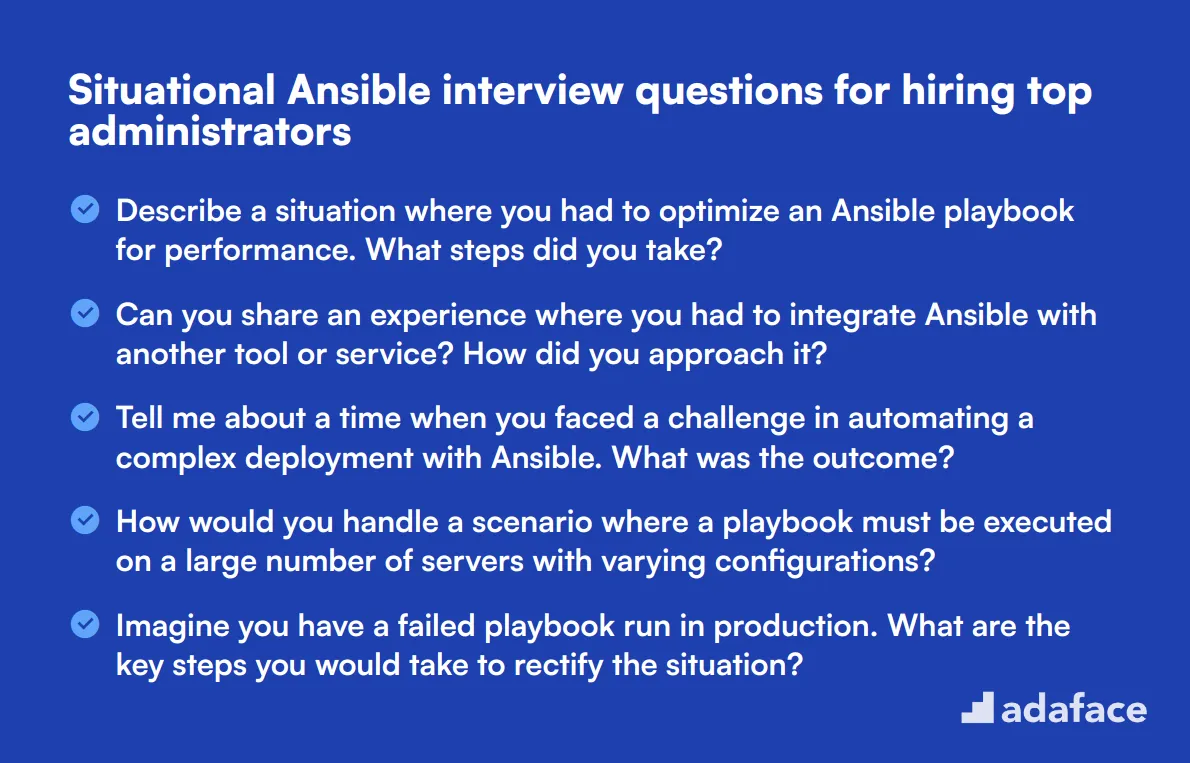
To evaluate candidates' problem-solving abilities in real-world scenarios, consider using these situational Ansible interview questions. They will help you gauge whether applicants can effectively apply Ansible in various contexts, ensuring they possess the practical skills needed for the role. This list can be especially useful when hiring for positions like a DevOps engineer or a cloud architect.
- Describe a situation where you had to optimize an Ansible playbook for performance. What steps did you take?
- Can you share an experience where you had to integrate Ansible with another tool or service? How did you approach it?
- Tell me about a time when you faced a challenge in automating a complex deployment with Ansible. What was the outcome?
- How would you handle a scenario where a playbook must be executed on a large number of servers with varying configurations?
- Imagine you have a failed playbook run in production. What are the key steps you would take to rectify the situation?
- Can you provide an example of how you used Ansible to automate a repetitive task? What were the benefits?
- Describe a time when you had to collaborate with a team to implement Ansible in an existing environment. What was your role?
- How would you approach documenting your Ansible playbooks and roles for future users in your team?
- Have you ever had to train someone on using Ansible? What approach did you take to ensure their understanding?
- Can you share an experience where you had to modify an existing playbook to meet new business requirements? What challenges did you face?
Which Ansible skills should you evaluate during the interview phase?
While it's challenging to assess every aspect of a candidate's Ansible expertise in a single interview, focusing on key skills can provide valuable insights. For Ansible interviews, certain core competencies are particularly important to evaluate.
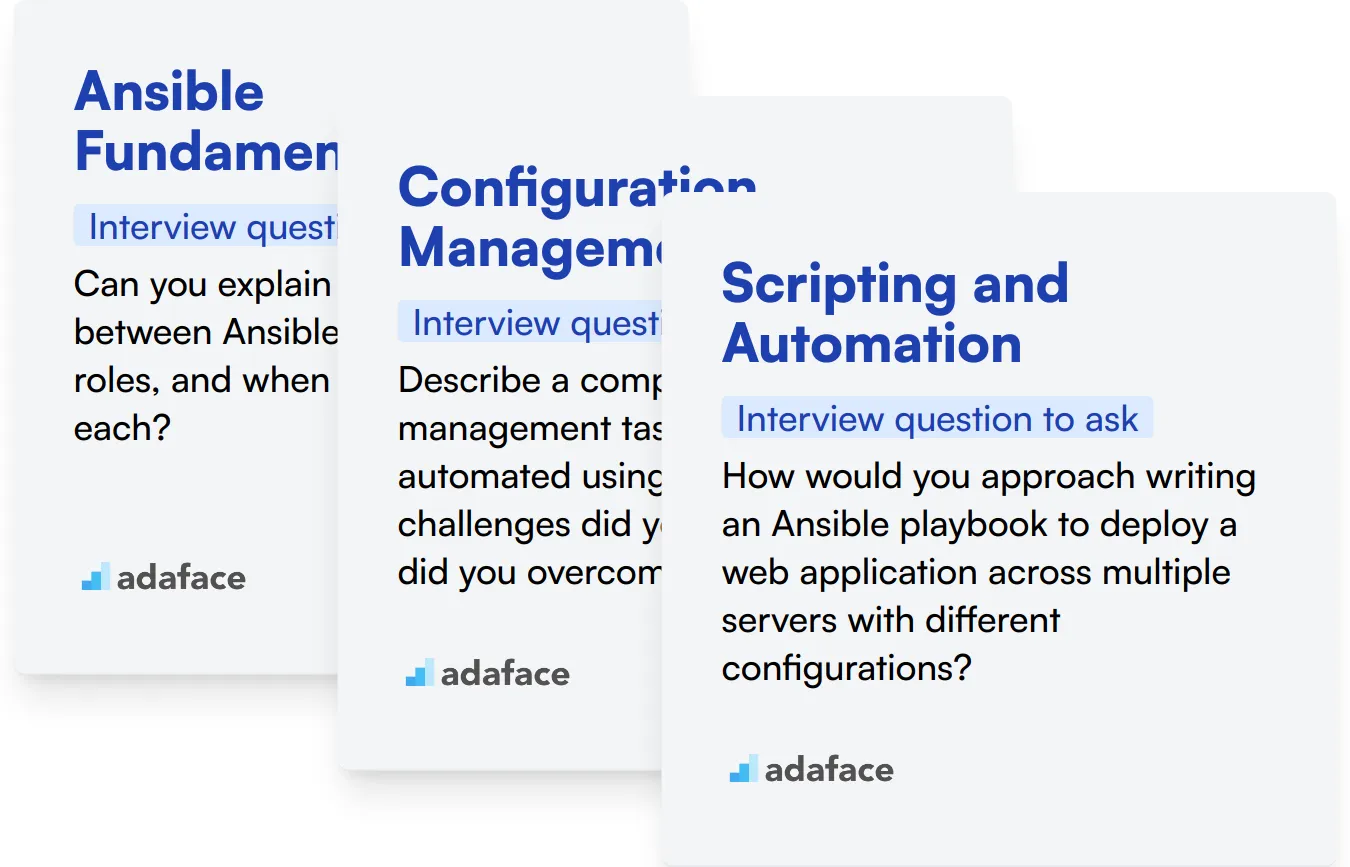
Ansible Fundamentals
Understanding Ansible basics is crucial for any administrator. This includes knowledge of YAML syntax, inventory management, and playbook structure.
To assess this skill, consider using an assessment test with relevant MCQs. This can help filter candidates based on their foundational Ansible knowledge.
During the interview, you can ask targeted questions to gauge the candidate's understanding of Ansible fundamentals. Here's an example:
Can you explain the difference between Ansible playbooks and roles, and when you would use each?
Look for answers that demonstrate a clear understanding of playbooks as ordered lists of tasks and roles as reusable units of organization. Strong candidates will explain scenarios where each is more appropriate.
Configuration Management
Ansible is primarily used for configuration management. Candidates should be able to demonstrate how they've used Ansible to manage system configurations at scale.
An assessment test focusing on configuration management scenarios can be useful to evaluate this skill.
To further assess this skill during the interview, consider asking:
Describe a complex configuration management task you've automated using Ansible. What challenges did you face, and how did you overcome them?
Listen for responses that showcase real-world experience with Ansible. Strong candidates will describe specific challenges and creative solutions, demonstrating their problem-solving skills in configuration management contexts.
Scripting and Automation
Proficiency in scripting is essential for creating effective Ansible playbooks and roles. This skill enables administrators to automate complex tasks efficiently.
Consider using a coding assessment that includes Ansible-specific scripting tasks to evaluate this skill objectively.
To assess scripting abilities in the interview, you might ask:
How would you approach writing an Ansible playbook to deploy a web application across multiple servers with different configurations?
Look for answers that demonstrate a structured approach to scripting, including considerations for variables, conditionals, and error handling. Strong candidates will discuss modular design and reusability in their playbooks.
Maximizing the Effectiveness of Ansible Interview Questions
Before putting your newly acquired knowledge to use, consider these tips to enhance your Ansible interview process. These strategies will help you make the most of your candidate evaluations.
1. Implement Skills Tests Before Interviews
Start by using skills tests to screen candidates before scheduling interviews. This approach saves time and ensures you're only interviewing candidates with the necessary technical skills.
For Ansible roles, consider using a DevOps online test or an Ansible and Jenkins online test. These assessments can evaluate candidates' practical knowledge of Ansible, configuration management, and related DevOps tools.
By using these tests, you can quickly identify top performers and focus your interviews on exploring their problem-solving abilities and cultural fit. This method streamlines your hiring process and improves the quality of your candidate pool.
2. Prepare a Balanced Set of Interview Questions
With limited interview time, it's crucial to select a mix of questions that cover various aspects of Ansible expertise. Choose questions that assess both technical knowledge and practical application skills.
Consider including questions about related technologies like Docker, Kubernetes, or Git. This approach helps evaluate the candidate's broader DevOps understanding.
Don't forget to include questions about soft skills such as communication and problem-solving. These are equally important for success in an Ansible role.
3. Master the Art of Follow-Up Questions
Asking follow-up questions is key to understanding a candidate's true depth of knowledge. This technique helps you distinguish between memorized answers and genuine understanding.
For example, if a candidate explains Ansible playbooks, follow up by asking them to describe a complex playbook they've created and the challenges they faced. This reveals their practical experience and problem-solving skills in real-world scenarios.
Use Ansible interview questions and skills tests to hire talented administrators
If you are looking to hire someone with Ansible skills, it's important to ensure they possess the right capabilities. The best way to accurately assess these skills is to use skills tests. Check out our Ansible and Jenkins Online Test or DevOps Online Test.
Once you've used these tests, you can shortlist the best applicants and call them for interviews. To get started, head over to our sign-up page or learn more about our online assessment platform.
Jenkins & Ansible Online Test
Download Ansible interview questions template in multiple formats
Ansible Interview Questions FAQs
Focus on configuration management, playbooks, roles, and situational problem-solving skills when interviewing Ansible administrators.
Ask situational questions and discuss real-world scenarios to evaluate a candidate's hands-on experience with Ansible.
Questions about Ansible roles help gauge a candidate's understanding of code organization, reusability, and best practices in Ansible.
Adjust the complexity of questions based on the role. Use basic concepts for juniors and more advanced topics for senior positions.

40 min skill tests.
No trick questions.
Accurate shortlisting.
We make it easy for you to find the best candidates in your pipeline with a 40 min skills test.
Try for freeRelated posts
Free resources




